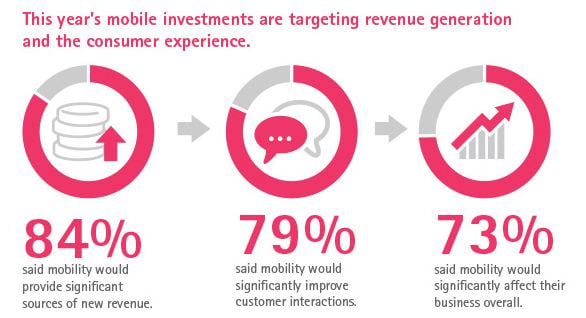There’s Revenue in Them Thar Mobile Devices

CIOs have learned to be skeptical of new technologies. After all, how many “revolutionary” IT trends turn out to have little or no impact once the novelty wears off and early adopters have  moved on to the next latest and greatest thing? According to a new survey of 413 global C-level IT executives from Accenture, CIOs have no such doubts about mobile devices and are rapidly gaining confidence in mobility as a revenue generator.
moved on to the next latest and greatest thing? According to a new survey of 413 global C-level IT executives from Accenture, CIOs have no such doubts about mobile devices and are rapidly gaining confidence in mobility as a revenue generator.
The 2013 Accenture CIO Mobility Survey indicates substantial majorities of respondents (79 percent) cited mobility as a revenue generator and said it would significantly improve customer interactions (84 percent) as well as significantly affect their business (83 percent). And 73% think mobility will impact their businesses as much or more than the Web revolution of the lates 1990s did, up from 67% last year. For context, think back to how much the dotcom era changed business. No wonder more than four in 10 (42%) CIOs ranked mobility as a top five priority for 2013.
Mobile Expertise in Demand
Considering the heightened interest in mobility among CIOs, it can only be expected that mobile expertise is a hot job skill these days. Survey results demonstrate 52% of companies said they would retrain existing staff to enable their mobile strategies, and 37% will hire full-time mobile expertise into their organization. The survey also found that more projects are being staffed internally this year (76%) than last (63%).
CIOs may want to re-examine the prospect of outsourcing some or all mobile development, especially considering budget concerns (41%) and and lack of interoperability with legacy systems (31%) are among the main barriers cited by companies as impacting their mobile priorities. ITO providers can offer significant cost savings as well as specialized knowledge to handle situations like legacy interoperability problems. In addition, quality ITO services are popping up in many nearshore locations and even in lower-cost domestic “onshore” locations like the technology hub emerging in Detroit.
More Strategy Needed
For many CIOs, mobile technology is developing at a pace faster than that with which they can keep up. Close to six in 10 companies surveyed (58%) have a moderately developed formal mobile strategy, and about one-quarter (23%) have an extensively developed formal mobile strategy, down from 31% from last year. Accenture says this initially surprising finding suggests that the velocity of the uptake of mobile technology is accelerating to the extent that companies are being pushed to take action before they can get a well-defined strategy in place.
CIOs developing or trying to optimize an existing strategy should be advised that survey results show that mobile device management (27%), collaboration (25%) and knowledge sharing (23%) are the top three most important features to a developed mobile strategy.
Where are you in the development of your mobile strategy? Regardless of how far along you are, mobile technology is evolving so quickly it’s almost inevitable your strategy could use some fine-tuning and if you don’t have one yet, revenue is literally exiting your pockets. Get moving!


